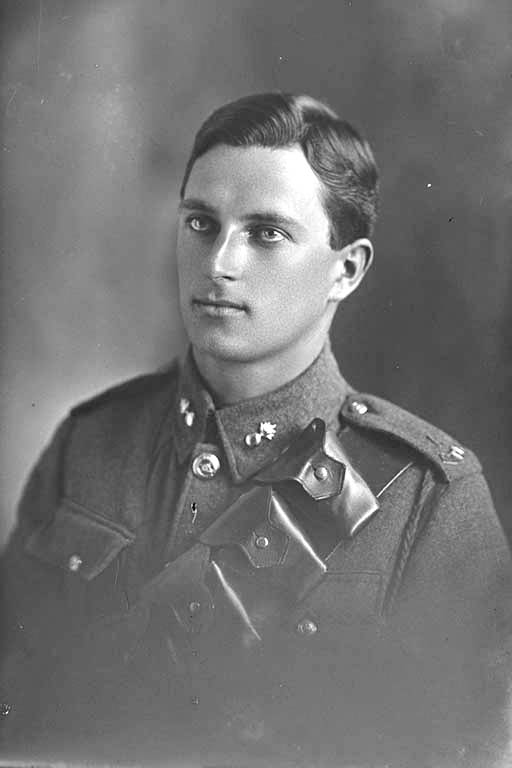Gnr
Robert Roderick Crighton Corbett McFarland
Informations sur naissance
|
Date de naissance: 16/09/1895 |
|
Lieu de naissance: Christchurch, Canterbury, New Zealand |
Informations générales
|
Profession: Clerk |
Informations service militaire
|
Pays: New Zealand |
|
Force armée: New Zealand Expeditionary Force |
|
Rang: Gunner |
|
Numéro de service: 12811 |
|
Incorporation date: 08/02/1916 |
|
Incorporation nom de lieu: Trentham, Wellington, New Zealand |
|
Unités: — New Zealand Field Artillery, 15th Bty. (Dernière unité connue) |
Informations sur décès
|
Date de décès: 31/10/1917 |
|
Lieu de décès: No. 3 Australian Casualty Clearing Station, Brandhoek, Belgique |
|
Cause du décès: Died of wounds (D.O.W.) |
|
Âge: 22 |
Cimetière
|
Nine Elms British Cemetery Parcelle: VIII Rangée: D Tombe: 14 |
Distinctions et médailles 2
|
British War Medal Médaille |
|
Victory Medal Médaille |
Points d'intérêt 2
| #1 | Lieu de naissance | ||
| #2 | Lieu d'enrôlement |
Mon histoire
Gunner Robert McFarland served in 15th Battery of 1st Brigade, New Zealand Field Artillery.
The New Zealand Division, apart from the field artillery, was withdrawn from the front line near Passchendaele from 16 October 1917.
The N.Z. Field Artillery, in the vicinity of the Winnipeg crossroads, remained to support the Canadian Corps and especially the 3rd Canadian Division which now occupied the ground vacated by the New Zealand Division. It supported the Canadian attack on 26 October and over the next five days the batteries were heavily shelled at night by German guns of all calibres.
It was on the night of 29/30 October that Robert McFarland received his wound, probably prior to the 5.50am start of the next Canadian attack of 30 October towards Passchendaele. He was wounded in both legs, with left femur fractured. He was taken to 8th Canadian Field Ambulance and evacuated to 3rd Australian Casualty Clearing Station near Poperinge. He died of wounds there on 31 October 1917 and was buried in the nearby Nine Elms Cemetery.
The New Zealand Division, apart from the field artillery, was withdrawn from the front line near Passchendaele from 16 October 1917.
The N.Z. Field Artillery, in the vicinity of the Winnipeg crossroads, remained to support the Canadian Corps and especially the 3rd Canadian Division which now occupied the ground vacated by the New Zealand Division. It supported the Canadian attack on 26 October and over the next five days the batteries were heavily shelled at night by German guns of all calibres.
It was on the night of 29/30 October that Robert McFarland received his wound, probably prior to the 5.50am start of the next Canadian attack of 30 October towards Passchendaele. He was wounded in both legs, with left femur fractured. He was taken to 8th Canadian Field Ambulance and evacuated to 3rd Australian Casualty Clearing Station near Poperinge. He died of wounds there on 31 October 1917 and was buried in the nearby Nine Elms Cemetery.
Rapports avec d'autres militaires 1
|
Thomas Nigel McFarland
Cousins |
Sources 1
|
Byrne J.R., New Zealand Artillery in the Field 1914-1918, (Eastbourne, Antony Rowe Ltd), 1920), pg. 190-200. Sources utilisées |
Complément d’informations 5
|
Commonwealth War Graves Commission Database https://www.cwgc.org/find-records/find-war-dead/casualty-details/137068 |
|
Namenlijst (In Flanders Fields Museum) https://namenlijst.org/publicsearch/#/person/_id=c41ddc96-b04f-4f13-b418-fc5af5d03511 |
|
Lives of the First World War (Imperial War Museum) https://livesofthefirstworldwar.iwm.org.uk/lifestory/7178727 |
|
Online Cenotaph (Auckland Museum) https://www.aucklandmuseum.com/war-memorial/online-cenotaph/record/c9385 |
|
The NZEF Project (UNSW Canberra) https://nzef.adfa.edu.au/showPerson?pid=166144 |
